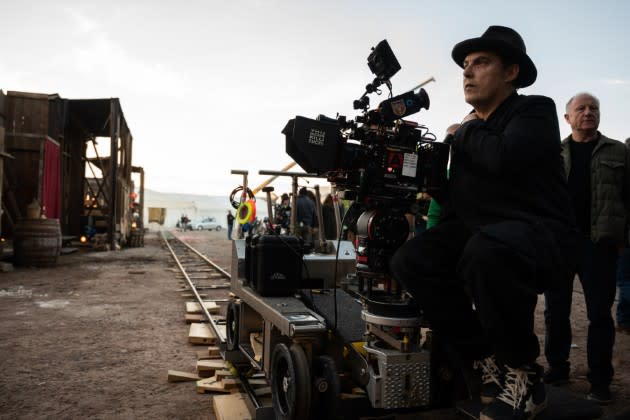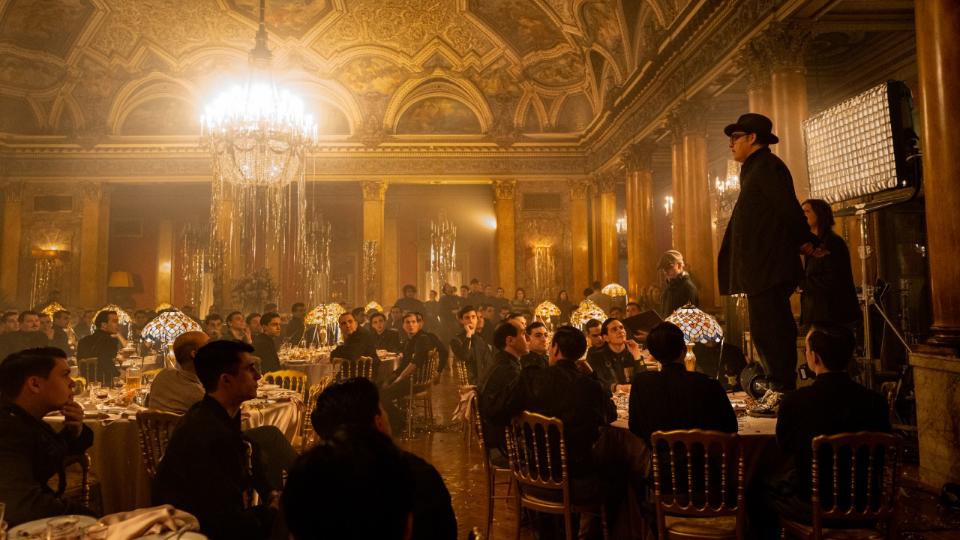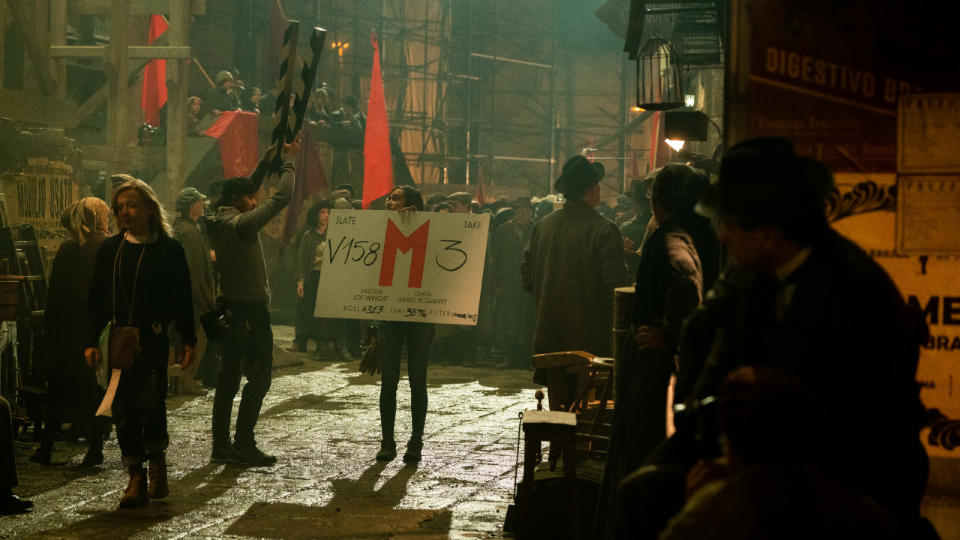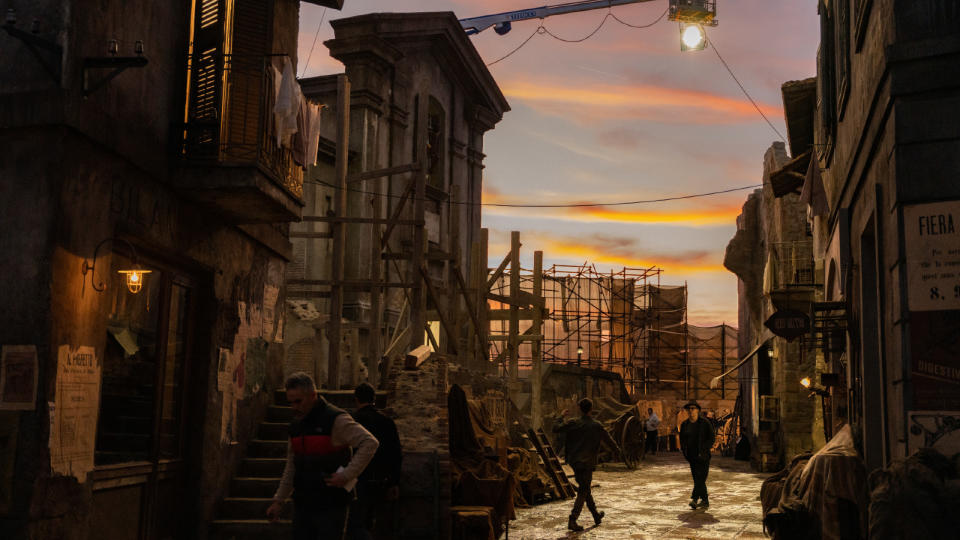Joe Wright and Luca Marinelli on Daring to Make Mussolini Charming for ‘M. Son of the Century’

The camera pans upwards. We see a balcony and a sliver of a window. A voice calls “Action!” Luca Marinelli emerges, dressed as Benito Mussolini. He looks down on the street below. Suddenly, he turns to the camera and speaks directly to the audience, the image of charm and seduction: “I’ve always loved dogs,” he quips.
This scene sums up the essence of M. Son of the Century, the new eight-episode limited series, directed by Joe Wright (Atonement, Darkest Hour) and produced by Sky Studios and Lorenzo Mieli’s Fremantle-owned The Apartment Pictures, in collaboration with Pathé and Small Forward. The series may be, as Nils Hartmann, executive vp of Sky Studios Italy and Germany says, repeatedly, the “largest and most ambitious” project the Comcast-owned studio is working on, but what stands out is the show’s unique tone and rhythm. The story of the rise of the Italian fascist leader is being told from the inside, showing how Mussolini could bewitch a nation and transform the politics of the 20th century. And, by casting the effortlessly charming Italian star Marinelli (The Old Guard, The Eight Mountains) as Il Duce, making the audience complicit in that transformation.
More from The Hollywood Reporter
Norwegian Political Comedy 'Power Play' Wins 2023 Canneseries
Cannes Film Festival Unveils Poster Featuring Catherine Deneuve
MIPTV 2023 Takeaways: Drama Boom is Bust But Reality TV Offers a Lifeline
“We wanted to create something dangerous and divisive, just like the theme and the character in question,” says Mieli. “Mussolini had this incredible ability to charm. He was charismatic. And we decided to focus precisely on this aspect, without beating around the bush. We’re telling a true story. But it was important to us that people could understand this character and his charisma. [Mussolini], in a sense, is similar to an actor.”
Instead of the classic biopic approach, Mieli says, M. Son of the Century aims to be “daring and brave [to] create a series that could be discussed.”
It is, Mieli admits, a risky approach — especially right now in Italy, where, after last year’s elections, the country is being ruled by the most far-right government since the fascist era. Prime Minister Giorgia Meloni got her start in politics in a far-right party set up by diehard followers of Mussolini, though her Brothers of Italy movement — the big winners of the 2022 election — stresses its democratic credentials.

M. Son of the Century represents a chance to explore the current significance of fascism and populism through an honest exploration of their modern-day origins. But it is walking a fine line: trying to make a 21st-century audience understand Mussolini’s appeal, without portraying the father of fascism as some sort of hero.
“My first reaction [when I was offered this role] was to run away, so to speak,” says Marinelli. “Before I started [shooting], I was shitting myself. We don’t want to celebrate Mussolini at all. He was a criminal. We only want to tell his story and who he was, in our own way, according to Joe’s vision. All the adjectives used to describe Mussolini put a distance between us and him. We need to understand that he decided to do what he did, that he followed this path, and that he was always aware of what he was doing. [Joe] is a maestro, and I’ve learned a lot from him. Like the devotion to this profession. Watching him at work was like watching an artist at work.”
For his part, Wright calls Marinelli the “most naturally gifted actor I’ve ever met” alongside his Darkest Hour star Gary Oldman. “He’s always done everything I asked, and sometimes more. I am overwhelmed by what he does, and I’m left glued to the screen.”
By setting the story at the start of Mussolini’s political career, when he was still working as a reporter, and was, in Mieli’s words, “a charmer [with] great charisma,” M. Son of the Century attempts to capture the complicated and ambivalent history of one of the 20th century’s most notorious figures.
M. Son of the Century, based on the first of a series of historical novels by Antonio Scurati on the life of Mussolini, tells the story of Mussolini’s rise, from 1919, when he founded his extreme fascist organization Italian Fasces of Combat, through the kidnapping and murder in 1924 of one of his main political opponents, Italian socialist politician Giacomo Matteotti, by fascist forces. Stefano Bises (Gomorrah – The Series, The New Pope) and Davide Serino (1992, 1993) adapted the book for the screen.

“We optioned the book roughly three years ago,” says Mieli, “so we’ve had a long time to shape this project. The book was very important to us as it offered essential information and a detailed documentation of those years. However, it is also a novel that tries to explain what this man did, from creating populism to fascism itself. Which is something we’re still dealing with today.”
Wright, says Mieli, was a logical choice. Not only because of his work on the Oscar-winning Darkest Hour, which explores the personal struggles of British Prime Minister Winston Churchill ahead of his decision to go to war with Adolf Hitler’s Germany, but also because, as a Brit, he brings an outsider’s perspective.
“Joe added something that an Italian director wouldn’t, most likely, have been able to,” says Hartmann. And the producers hope Wright will tell the Mussolini story in a way that will speak “not just to an Italian audience, but will catch the attention of an international one too.”
“I feel I have a responsibility,” says Wright. “I’m aware of the scope of this story. Most of all because it’s characters that haven’t been analyzed much. When you’re making a movie about Churchill or Jane Austen [Wright directed the 2005 adaptation of Pride and Prejudice], you know that there are many other movies about Churchill and Jane Austen out there.”
Fascism, notes Wright, “is not a theme unique to Italy. It’s everywhere, and that is truly terrifying. That is the problem.”
Fremantle, who own producers The Apartment, has a five-year deal in place with Cinecittà Studios, but the group says it was Wright’s decision to shoot the series on the legendary Roman backlot. For the show, entire neighborhoods, hotel rooms and newsrooms were thus re-created in 1920s style. The attention to detail, from production designer Mauro Vanzati, is astounding, almost obsessive. Hotel nightstands are stacked with books from the period. Old newspapers, with authentic 1920s headlines, lie discarded on desks. It would take an Italian mason to spot if the countertops and spotless floors of Mussolini’s suite are fakes or actually hewn from Tuscan marble.
Every detail is being caught by Wright’s Atonement cinematographer Seamus McGarvey, who is the first unit DOP on the series.

The scope of the project is immense. At the time of our visit, Wright had already been shooting for 94 days. “This is the longest thing I’ve ever shot,” he admits.
While Wright is busy shooting some details, second unit director Sophie Muller and cinematographer Paolo Carnera (Gomorrah, The White Tiger) set up on Cinecittà’s high-tech LED wall, Europe’s second-largest, preparing a scene with Paolo Pierobon, who plays Gabriele D’Annunzio, an Italian poet who was an early supporter of, and inspiration for, the fascist movement.
All the details — costumes, furniture, architecture — are historically accurate. But, explains Bises, the tone and visual style break from “the traditional path of a costume drama. For a long time we worked on tone, which is indeed fundamentally dramatic but contains comedic elements as well. We decided to have Mussolini talk directly to the camera in some scenes. Because Mussolini used two languages: a public one, where everything was carefully planned out, and a private one, where he was definitely more impulsive.”
While the screenwriters worked on finding the right tone, Wright worked on the rhythm. On set, he says, he puts on music to “re-create the atmosphere of the scene we’re about to shoot.”
Reportedly, the soundtrack for M. Son of the Century will be composed by legendary English electronic music duo The Chemical Brothers, ensuring M. will not be your grandfather’s period drama.
“We wanted to show the grotesque side of this tragedy”, says co-writer Serino. “We didn’t want to get on our soapbox with this series. Its tone will probably surprise you.”
M. Son of the Century will go out next year, airing exclusively on Sky in Italy, the U.K., Ireland and German-speaking Europe. Fremantle is handling sales for the rest of the world.
Best of The Hollywood Reporter
